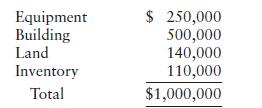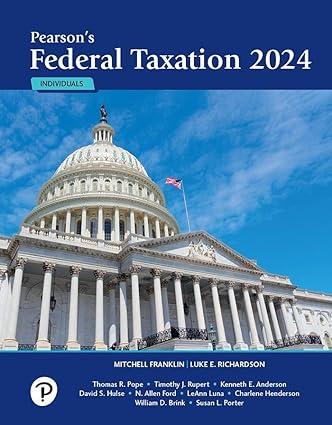Assume the same facts as in Case Study Problem I:13-69 except you have the following market values
Question:
Assume the same facts as in Case Study Problem I:13-69 except you have the following market values as a result of an appraisal:

Tom insists that \($150,000\) of the purchase price should be allocated to inventory and \($100,000\) should be allocated to land. He refuses to complete the purchase unless the allocation is made as he requests. What action should you take with respect to Tom’s request?
Data From Problem 13-69
Your client, Kent Earl, whose tax rate is 35%, owns a bowling alley and has indicated that he wants to sell the business for \($1\) million and purchase a minor league baseball franchise. His business consists of the following tangible assets:

Because you have another client, Tom Quick, who is interested in purchasing a business,
you informed Tom of Kent’s interest in selling. Tom wants to purchase the bowling alley,
and the price sounds right to him. The bowling alley business has been very profitable in the last few years because Kent has developed a loyal group of customers by promoting bowling leagues during the week days and a special Saturday afternoon session for children in the elementary school grades. Kent and Tom have come to you and want to know how the transaction should be handled for the best tax results. You know that the \($1\) million purchase price will have to be allocated among the assets and it will be necessary to estimate the FMV of all assets. Because FMV is often subjective, Kent and Tom recognize that some flexibility might exist in allocating the purchase price. For example, it might be just as easy to justify a FMV of \($300,000\) or \($325,000\) for the equipment.
a. What advice do you have for Kent with respect to the allocation (i.e., should he be interested in allocating more to some assets than others)? Explain the reasoning for your advice.
b. Would your advice to Kent be different if he had a large amount of capital losses and no non recaptured net Sec. 1231 losses?
c. What advice do you have for Tom with respect to the allocation (i.e., should he be interested in allocating more of the purchase price to some assets than to others)?
Explain the reasoning for your advice.
d. What advantages might result from having Kent sign an agreement not to compete
(i.e., operate a bowling alley)?
e. Should you have a concern about the ethical implications of advising both Kent and Tom?
Step by Step Answer:

Pearsons Federal Taxation 2024 Individuals
ISBN: 9780138238100
37th Edition
Authors: Mitchell Franklin, Luke E. Richardson





